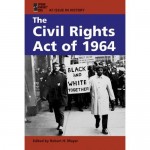Private Discrimination, Rand Paul, and the Civil Rights Act of 1964
Political Correctness, Racism, Statism I’m no fan of electoral politics, and never did think Rand Paul was a consistent libertarian or even as libertarian as his father, Ron Paul–though his recent remarks on the Civil Rights Act of 1964 make me think he may be more libertarian than he feels he can admit publicly. I don’t agree with many of his stated positions, but of late he’s being attacked for what is most libertarian: his view that private businesses have a right to discriminate on their own property (see, e.g., attacks by the monstrous Paul Krugman and an editorial from the New York Times).
I’m no fan of electoral politics, and never did think Rand Paul was a consistent libertarian or even as libertarian as his father, Ron Paul–though his recent remarks on the Civil Rights Act of 1964 make me think he may be more libertarian than he feels he can admit publicly. I don’t agree with many of his stated positions, but of late he’s being attacked for what is most libertarian: his view that private businesses have a right to discriminate on their own property (see, e.g., attacks by the monstrous Paul Krugman and an editorial from the New York Times).
Libertarians can debate whether the portions of the CRA64 that prohibit states and municipalities from discriminating on the basis of race, gender, etc., are libertarian or constitutional. As for the latter, the Fourteenth Amendment was illegally ratified, making legislation enacted pursuant thereto, such as the CRA64, unconstitutional (for more on the ratification issue, see Gene Healy’s The Squalid 14th Amendment). As for the former: libertarian centralists naively favor the federal government having broad powers to supervise the states, while libertarian decentralists and anarchists fear the central state and favor decentralization (see my posts Libertarian Centralists; The Libertarian Case Against the Fourteenth Amendment; Healy on States’ Rights and Libertarian Centralists; The Heroic Gene Healy on the 14th Amendment: “If this be heresy—then make the most of it!”; see also the insightful comments of J.H. Huebert quoted here).
But there can be no doubt that the provisions of the law that prohibit racial and other discrimination by private businesses in employment or accommodation (such as hotels and restaurants) are manifestly unlibertarian and unjust. Sadly, however, some libertarians actually endorse the state’s infringement on property rights as embodied in this law. Most of the prominent libertarian defenders of the unlibertarian aspects of the CRA64 seem to be associated with the Cato Institute, and include Brink Lindsey (see Cato Scholar Scolds Rand Paul, Gives OK to Soup Nazi; Lindsay’s stance is perhaps not surprising given his pro-war views), David Bernstein, Richard Epstein, and Roger Pilon (see my post Libertarian Centralists–Pilon’s stance is not too surprising, given his defense of the Police America Act). (Julian Sanchez, in a somewhat maundering article, seems to weakly defend Paul, but I’m not sure.) I don’t know if such a major deviation from libertarianism arises from shaky foundations (such as utilitarianism), naivety about the ability of the central state to do justice, or fear of a politically-correct backlash, but it’s pretty sad that a leftist is better on this issue than some libertarians–I have in mind Robert Scheer, who gave a surprisingly good and quasi-libertarian defense of Rand Paul on KCRW’s Left, Right and Center last week–he tears apart the Rand-bashing of his co-hosts Ariana Huffington (who drops the PC racism junk) and Tony Blankley (who says he agrees “intellectually” with Paul but still calls him a kook); see also Scheer’s article Who’s Afraid of Rand Paul? (Even John Fund and Aayan Hirsi Ali, both who seem libertarianish, gave a decent defense of Paul on the latest Bill Maher show, if memory serves). See also the partial transcription of Scheer’s remarks here:
…
Private Discrimination, Rand Paul, and the Civil Rights Act of 1964Read More »
Private Discrimination, Rand Paul, and the Civil Rights Act of 1964 Read Post »
